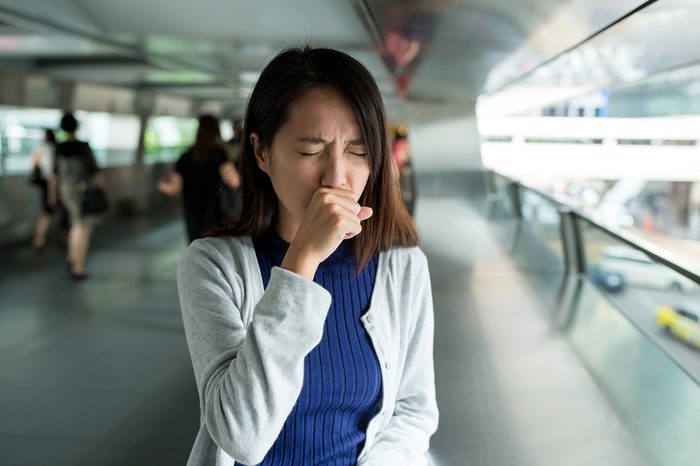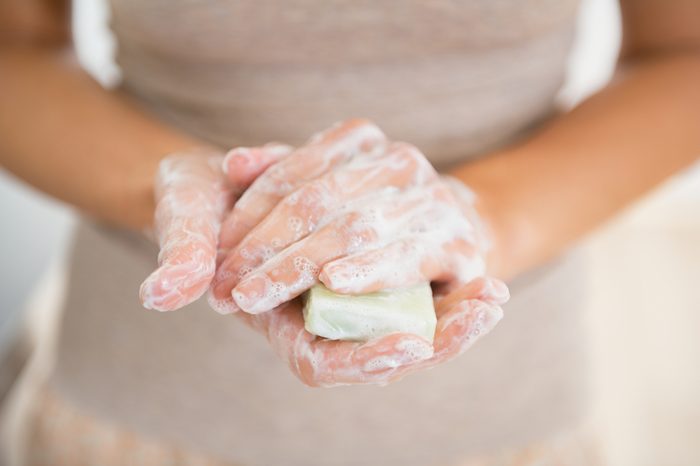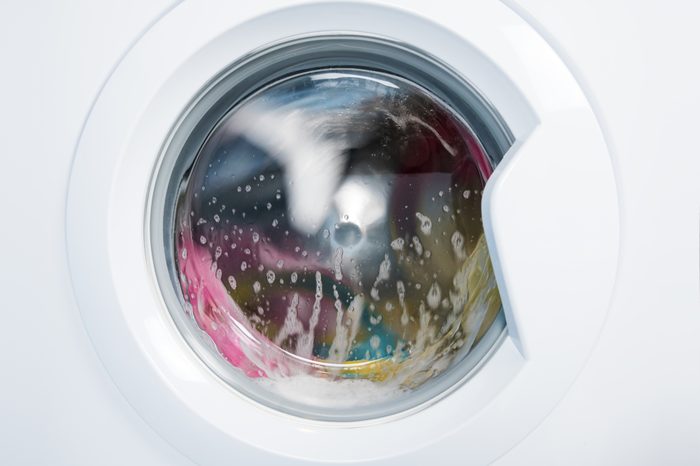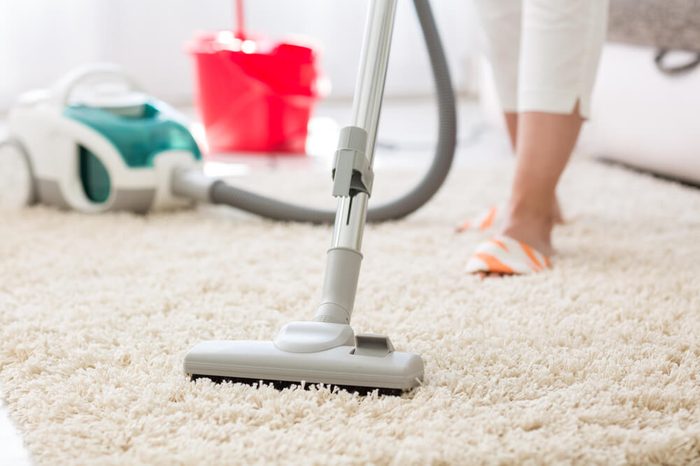Hello, stomach bug
Meet winter’s Public Enemy No. 1: norovirus, also known as one of the causes of stomach flu or the cruise ship virus. Norovirus is everywhere: Responsible for around 20 million illnesses in the U.S. every year, according to the Centers for Disease Control and Prevention (CDC), it’s associated with more than two-thirds of outbreaks of gastroenteritis (basically inflammation of the stomach and intestines, usually due to infection with a virus or bacteria). Norovirus is responsible for almost half of gastroenteritis-related hospitalizations—and 86 percent of deaths. It’s the most common culprit in children’s stomach infections. (Here are some clear signs of getting sick you should look out for.)
You can catch norovirus from an infected person, a contaminated surface, or contaminated food and water (ick alert: It’s spread by droplets of fecal matter and vomit). It’ll aggravate your stomach and intestines, which can cause intense pain and nasty vomiting and diarrhea that’ll keep you within a 10-foot radius of a toilet for about a full day or two. Keep in mind that even though people sometimes call it a stomach flu, that’s a bit misleading. Norovirus is completed unrelated to influenza, which is a respiratory virus that doesn’t usually cause diarrhea or vomiting. That means your annual flu shot will not protect against norovirus.
Getting sick can often be inevitable if you’re exposed to the germs that cause illness. But these tips may help protect you and your family (and help you recover safely if you do fall ill).

Know your enemy
It’s called the cruise ship virus for a reason—norovirus is so contagious that it can spread like wildfire, especially in a confined area like a cruise ship. “When people are acutely ill with norovirus, they shed up to 1 billion viral particles in each gram of stool,” says Robert Frenck, MD. an infectious disease expert and professor in the department of pediatrics at Cincinnati Children’s Hospital. “We have done studies that show as few as 1,000 viral particles can make you sick.”
Norovirus is also brilliant in that its very unpleasant side effects—diarrhea, vomiting—cause you to spread it to others, according to Stephen Prescott, MD, president of the Oklahoma Medical Research Foundation.
“The best option for staying healthy, of course, is to not be exposed to norovirus in the first place,” he said on the OMRF website. “But if you or a loved one gets sick, isolation and common sense are the best ways to stop the spread.” Here are 20 things the flu virus doesn’t want you to know!

Use soap and water, not hand sanitizer
Alcohol-based hand sanitizers may stop bacterial infections and even cold and some influenza strains in their tracks. But when it comes to norovirus, they don’t do much good. According to the CDC, “Hand sanitizers aren’t as effective as washing hands with soap and water at removing norovirus particles.” Make sure you know the surprising things you should not do if you have the flu.

It’s all about the bleach
Norovirus is hardy and hard to get rid of; light cleaning won’t do the trick (the virus can survive mild cleaners). A concentrated solution of ¼ cup bleach and 2 ¼ cups of water for surfaces that may have been splattered with viral particles (tile floors, countertops, sinks toilets, etc.) is recommended. For other surfaces, use the same solution diluted with 9 more cups of water. Let the bleach solution sit for 10 minutes before wiping away. (This is the real difference between the cold and the flu.)

Don’t hand-wash dishes
Norovirus can live for longer than you would think on surfaces. For this reason, fire up the dishwasher while you’re sick, and even in the days after as opposed to hand-washing them. Load up the dishwasher, even for water glasses or utensils you’d ordinarily just rinse in the sink. (Watch out for these 6 influenza symptoms you should never ignore.)

Power up your laundry routine
Washing machines notoriously harbor fecal matter, according to a 2015 study published in Frontiers in Microbiology, which means that doing laundry can actually spread germs to other clothes (and possibly people).
Wash any clothes, towels, or sheets that have come into contact with vomit or stool right away. Use the hottest water cycle you can and bleach if possible. When a family member is actively doing battle with norovirus, you may also want to run an empty cycle with bleach in between washes to clean out the machine. (Learn about the 8 things that could mess up your flu shot.)

Clean those less-obvious spots
Of course, you’ll scour your bathroom tiles, but don’t overlook all the little places a sick family member has likely been in contact with. (Remember, norovirus has a one- to two-day incubation period, which means someone can start spreading the germs before they actually have symptoms). Since the virus can linger on hard surfaces for days, it’s important to clean (with a diluted bleach solution) such places as doorknobs, computer keyboards, remote controls, and phones. Follow these 20 tips from people who never get sick.

Refresh your carpet
Norovirus can live on rugs for weeks, according to a report from the Cleveland Clinic, so if someone throws up on your carpet, pay to have it professionally cleaned. Make sure you stop making these everyday mistakes that raise your risk of catching a cold.

Incubate yourself
Once the worst-of-the-worst symptoms subside, it’s tempting to go back to work or send your kids back to school. But you may still be contagious for a few days after you start feeling better, according to the Mayo Clinic. Start one of these 10 habits that doctors use to avoid getting the flu or a cold.

Drink, drink, drink
Once the bug takes hold, there’s not much you can do to get it out of your system, other than just riding out the symptoms. Staying hydrated, though, is key to avoid complications like hospitalization. Sip water, sports drinks, or juice to replace fluids and essential vitamins and minerals your body is shedding along with all that vomit and poop. Most healthy people who stay hydrated start to feel better within two to three days. Avoid these 10 foods that can make your cold or flu worse.

Count your genetic blessings
If you seem to have evaded norovirus despite being exposed to it, you may have won the genetic lottery. “About 20 percent of the general population is immune to norovirus, likely because they lack a receptor on their gut surface for the virus to bind,” says Dr. Frenck. And of the other 80 percent of people who are susceptible, only about 70 percent will get sick when they are experimentally administered the virus, he says. So there may be other still-unknown factors that influence whether someone gets sick or how severe a case they develop. Next, here are the 59 rampant health myths you need to stop believing.
